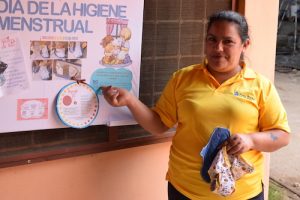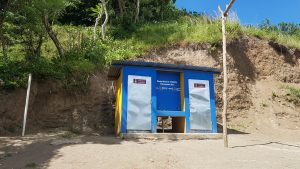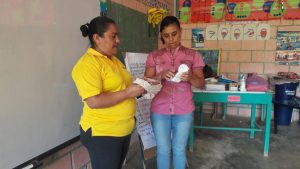 Since 2016, Menstrual Hygiene Management (MHM) education has been a critical component of PWW’s WASH (water, sanitation and hygiene) programs.
Since 2016, Menstrual Hygiene Management (MHM) education has been a critical component of PWW’s WASH (water, sanitation and hygiene) programs.
In addition to training families in communities, PWW incorporates menstrual hygiene education into schools through teacher workshops and training programs. This training, which impacts boys and girls, includes:
- Changes in Puberty
- Menstruation
- Menstrual Cycle
- Barriers and Solutions to introduce MHM into the different areas of study and lessons
- How to develop a plan for implementing MHM
- How to make reusable menstrual pads
 PWW WASH school programs also include the construction of gender-specific latrines and handwashing stations. Combined, these tools and education significantly reduce the barriers girls face while menstruating at school, keeping them safe and empowering them to stay in school to achieve an education.
PWW WASH school programs also include the construction of gender-specific latrines and handwashing stations. Combined, these tools and education significantly reduce the barriers girls face while menstruating at school, keeping them safe and empowering them to stay in school to achieve an education.
Karla Vargas is one of PWW’s Lead Facilitators in Honduras for WASH program implementation and training. She is very proud of the tremendous impact PWW has created in lives of so many families and among the school populations.
Karla shares the story of a woman who thanked Karla for “healing” her. The woman explained that she had experienced a long history of vaginal allergies caused by the materials used in commercial sanitary pads. Recently, the woman’s niece (a student) returned home from a PWW training session that she had participated in at school. Since her niece had not yet started her monthly cycle, she gave the reusable pad they had made to her aunt. Her aunt tried it and, for the first time in her life, she is free of her allergy. The woman and her niece have since made many more reusable pads together. They will be well-prepared when her niece’s menarche comes.
 During a recent conversation with a teacher, Karla learned that one of the teacher’s fourth grade students, who had not begun menstruating yet, began using the reusable pad that she made in class right away. The girl didn’t want to wait until her period began; she wanted to practice and be ready when the time came. She did not want to be surprised. Empowered, this young girl took her future into her own hands and “prepared for a quick and practical emergency response”!
During a recent conversation with a teacher, Karla learned that one of the teacher’s fourth grade students, who had not begun menstruating yet, began using the reusable pad that she made in class right away. The girl didn’t want to wait until her period began; she wanted to practice and be ready when the time came. She did not want to be surprised. Empowered, this young girl took her future into her own hands and “prepared for a quick and practical emergency response”!
Karla has learned that, all too often, mothers transmit their fears and beliefs about their menstrual cycles to their daughters. She has also learned that mothers really want to be guided about how to talk with their daughters to prepare them for menstruation.
A woman recently told Karla that when she had her first period she was so afraid. She thought it was because she had done something bad. She didn’t want her mother to know, so she sat in the river for many hours waiting for the blood to wash away. Finally, she couldn’t stay any longer, so she went home and told her mother. Her mother responded simply by saying that it was “something natural”. That was the extent of the explanation.
Today, this same woman is a midwife. She is very grateful for PWW’s MHM training, telling Karla that the program “will create a positive impact on so many girls. They will not have to go through the terrifying moment I had to that day. They will understand the purpose of their cycle and how to manage it.”
Menstrual Hygiene Day is May 28 – “Periods don’t stop for pandemics.”
“Menstruation in the times of COVID is very stressful to girls and women because they can’t get to a store and purchase supplies. But with those who have learned how to make reusable pads from our team, it gives them much-needed support and relief.”
– María Inestroza, PWW’s Country Director in Honduras
In addition to the obvious challenges that coronavirus is creating globally, including Honduras, something very specific to girls and women is the lack of ability to access menstrual hygiene supplies to manage their monthly cycles.
This week, Karla is working on a video that can be shared across Spanish-speaking countries, teaching women and girls how to make reusable menstrual pads with materials they have at home. Stay tuned!
You can make a difference in the lives of girls and women by making a donation.

